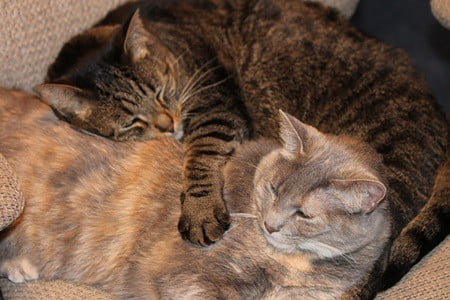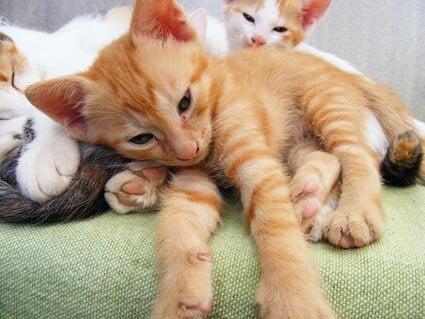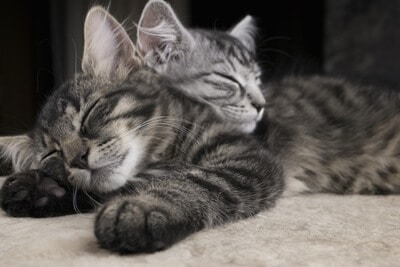Female cats (queens) give birth to large litters, so kittens have an average of 4-8 brothers and sisters. Their mothers also care for their kittens for a minimum of 14 weeks, so related cats spend lots of time together. So, it’s natural to wonder if cats always know that they’re from the same family.
Cats know that they’re related based on a shared scent. Mothers will treat their own kittens differently from outsiders, and siblings seem to get along well, even once they’ve reached adulthood. However, if the siblings are separated, they may forget each other as their shared scent will have been lost.
The reason why cats recognize members of their family as kittens is evolutionary. The queen will take care of her offspring if she recognizes them and has an attachment, and the kittens will stay with their mother if they recognize her. Once the kittens have grown up, she’ll treat all cats the same, regardless of whether they’re hers.
Do Cats Recognize Siblings?
When the siblings live together with their mother, they’ll all have the same scent. They’ll smell of their mother and living environment, allowing for easy identification of each other.
If a non-related cat that looked the same were to wander in, the others would immediately know it was a stranger as it wouldn’t smell the same. Consequently, it would likely be met with hostility.
Siblings recognizing each other is evolutionarily advantageous. By rejecting outsiders, it ensures that the group’s collective genetics will be passed on to the next generation.
Accepting a non-related cat would mean that the stranger’s genetics were passed on. It’s beneficial for the parents and their sibling group to ensure their own survival.
However, once they grow up into adult cats, the siblings may not recognize each other. They may act as if they’re strangers, even fighting over territory and food.
Do Cats Treat Siblings Differently?
Siblings treat each other differently when they’re kittens. They’re comfortable in each others’ presence, so they’ll play together, groom each other, eat at the same time, and live huddled up together.
This is in contrast to what happens if you introduce two non-related cats to each other as adults.
House cats aren’t like lions, living in prides. Male and female house cats are loners and have their own territories.
There’s some evidence that siblings remember each other once separated. According to Behavior, related cats will mate less frequently than cats that aren’t.
Female feral cats mate with various males but don’t accept every male that wants to mate with them.
Females would often choose not to mate with any males they were related to. This indicates that the pair can smell some connection, which indicates that they wouldn’t make a successful mating pair.
However, to confuse matters, it seems that sibling cats will mate with each other.
Will Cats Remember Siblings after Being Separated?
If you separated one of the kittens from its family for several weeks or months, it likely wouldn’t smell the same as it used to. Consequently, the mother and kittens would likely reject it.
Kittens are rarely separated from their siblings early in life due to the watchful eye of their mother. Only once the kittens are old enough to smell, hear and see the world around them will they separate.
It’s uncommon to separate kittens to sell or give away before they’re old enough to be weaned. Once they’re fully weaned and socialized, only then will they be separated. At this point, the siblings don’t need to remember each other.
When Should You Separate Cat Siblings?
It’s a misconception that you should separate kittens when weaned. The period after full weaning is just as important as it’s during this time that kittens first learn to socialize with other cats.
Cats learn to socialize with their siblings and parents during this time. In weeks 7-14, kittens learn from observing their mothers. According to the journal Animals, this is when kittens learn to socialize with humans.
They watch as their mothers play and groom, doing the same. If you were to separate a kitten from its siblings during this time, its social development would be thwarted.
So, kittens should be separated from their mother after 14 weeks.

Do Cats Treat Their Offspring Differently?
Cats can recognize which kittens are their offspring based on their scent.
The mother can instantly identify a non-related kitten that sneaks into the sibling group, rejecting it as she won’t want to waste her milk on them.
That doesn’t mean that a cat will never help raise the kittens of other cats, especially in large feral colonies. However, if the mother already has a large litter that she struggles to feed, attempting to take care of another kitten may mean that one of her own offspring dies.
Also, male tomcats treat their kittens differently from the kittens of other cats. Unfortunately, a tomcat can kill the kittens of other toms, which is a behavior that stems from seeking an evolutionary advantage. If the tom kills the other cats’ kittens, his own kittens are more likely to survive.
Do Cats Remember Their Kittens Years Later?
Once a kitten leaves its litter in the wild, it goes to live on its own elsewhere. When this happens, the cat and its mother are estranged, and they’ll treat each other as they would any other cat.
When you think about a cat’s idea of social structure, you may compare it to lions, but this isn’t the case.
Lions live in prides, large groups of many lions that live and hunt together. According to Current Zoology, even captive-bred lions still understand this social structure when reintroduced to the wild.
However, lions are the outliers of the cat family. Other cat species, whether small or large, are solitary animals. That’s why domestic cats enjoy spending so much time alone, especially compared to other domesticated animals that enjoy forming ‘packs’ with their owners.
When a cat leaves the litter, there’s no evolutionary need for the pair to treat each other differently. That being said, it’s possible that the pair still recognize each other, and they may know that they’re related but fight anyway.
If you keep the cat and its grown kittens together in the same home, they may get along better than two unrelated cats. However, they’ll still fight over food and space, just like any feline pairing would.

Do Cats Recognize Their Parents?
When kittens are first born, they recognize their mothers. They imprint on their mothers shortly after birth and recognize them primarily based on smell. Imprinting keeps the kittens safe.
However, kittens don’t recognize their fathers because they don’t feed or protect their young. Kittens feed on their mothers’ milk, so the father can’t assist in that way. The tomcat’s objective is usually to sire another litter.
A cat won’t treat its parents or siblings differently once they’ve grown up and leave to live independently. It’ll fight to keep them away from its territory and won’t share food.
Whether cats recognize their parents is unclear, but they don’t treat their parents as ‘family’ in the way people do.
Should I Adopt Littermates?
Moving to a new home is a difficult time for cats.
The new environment can be challenging due to the presence of other pets, different home layouts, loud noises, and completely new foods. This can be stressful and lead to fear and skittishness.
However, if the cat is with a sibling, it has them there for support. It’ll still recognize them from growing up together and know its scent. This will lessen the adverse effects of starting a new life.
Kittens began life close to each other, so they’ve played, groomed, and shared food. The opposite is true for two cats who are strangers. If you have one cat and get a second cat to keep it company, the two may dislike each other.
Cats know their mother and littermates until the point that they’re separated. Once the family scent fades, queens don’t recognize their litter, and littermates don’t recognize their siblings.

